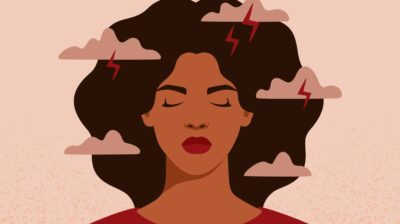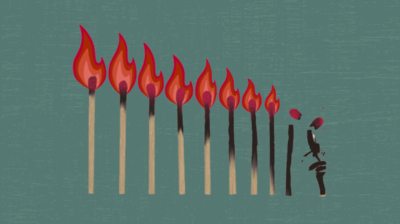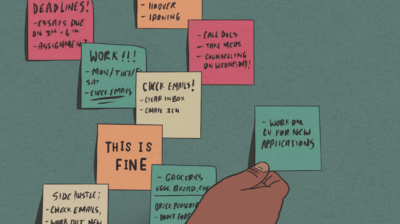When it comes to burnout listening to your body is key
Danya talks about the experience of burnout in college and how taking a break was part of the recovery process.

We’ve all heard the phrase, “listen to your body, it will tell you what it needs.” That’s the advice we hear from most medical professionals, but I don’t think we’re ever been shown how to truly get in tune with our bodies. We live in a society built on deadlines and constant pressure: whether that’s from work, school, college, or other external factors. So, it’s extremely difficult for most of us to step back and evaluate ourselves or whatever situation we find ourselves in. A lot of the time, unfortunately, we leave it too late.
I had my fair share of experiences with my mind and body totally burning out. The first time arose towards the last few months of the Leaving Cert: I barely slept, I lost a lot of weight and I battled extreme bouts of mood swings. By Christmas, I completely isolated myself from friends and family because my focus was entirely on college. This was around the time I was diagnosed with depression.
The burnout cycle
Everything improved slowly (albeit surely), and I began enjoying life again, with some support from my loved ones and attending regular therapy sessions. But I didn’t fully process my feelings, nor did I practice enough wellbeing exercises or stress management when it did inevitably come back. Instead, I shut those feelings down and pretended that everything was fine.
I suffered another burnout again in my third year in the beginning of 2020. Coming up to the second semester, I would sit in class and think, “What am I doing here? What’s the point of it all?” I persevered through my work anytime those thoughts came up. For a course I once adored, I began resenting it entirely.
Most days, I would leave college to go home early because I couldn’t take the (physical, emotional and mental) exhaustion. My body and mind gave me all the signs until I could no longer ignore them. I completely shut down. One day, I started crying and from there, I couldn’t stop.
Taking a step back from college
I was just a few months shy of finishing that semester and I knew that if I kept going the way I was going, I would eventually drop out. And it was this point I begrudgingly decided to step back. It was difficult having this conversation with my family, who were undoubtedly concerned about my wellbeing.
The “but what if you don’t go back after the year is up?” topic came up more than once. But I was more than confident in my decision. I knew I would eventually go back, but I needed to focus on my mental health. I needed to not think about college for a while: no essays, no exams, no deadlines. After 15+ years of nonstop education, I knew I would likely never get another chance to do this. So, I booked myself in for therapy and got a part-time job.
Student burnout
Looking back on my decision, and how far I’ve come, I’m extremely proud of my progress. But being back in college now, and chatting with other students, especially those who have been an essential worker throughout the last two years of the pandemic, I realised how common these feelings are. But we are not taught how to stop it, nor how to manage our stress when it does arise (and inevitably worsen).
I do not believe students are receiving adequate support. We have been consistently ignored or blamed by the older generations for being “too lazy.” When in reality, we are not capable of sustaining ourselves in a country that constantly fails us. With college course requirements getting higher, tuition fees at an all-time high, a laughable hourly wage paid by employers that overwork us and housing/rent prices at an astronomical rate, how are we expected to juggle a healthy balance in life? How are we expected to sit back and say that everything is fine?
Burnout is a social issue
Burnout can be very dangerous if it’s not treated the right way. Especially if a workplace or school/college has little to no support access. Introducing more effective measures for students and workers is needed now, more than ever. The pandemic has not been kind on anyone’s mental health or wellbeing, and it was abundantly clear that the ones who took one of the hardest hits during the pandemic were minimum wage workers, who were forced into packed, isolated and unsafe environments. The supposed “heros” who were keeping their country afloat were given very little to show for all of their hard work.
With the extensive waiting lists for mental health support (for both young people and adults), it has only exacerbated the situation overall. Nevertheless, the pandemic has shed some light on the importance of these issues. The Irish Government is very aware of this, and yet there is still a lot of work to do before we make any progress.
Although my experience was really difficult for me, I am grateful that I was able to defer. However, there are countless others like me who will never get the chance to step back when life weighs them down. It is simply not feasible for most. Unfortunately, for many working-class citizens barely scraping by in this economy, especially in Ireland, they cannot defer their responsibilities. They have bills to pay and families to feed. All of this, on top of trying to “stay positive.”
My advice on burnout
Being stuck in a perpetual state of crippling confusion, doubt, frustration, and despair can lead to severe detriment. It is more than simple feelings of stress. Work culture tells us to keep pushing through and to go beyond what is expected of us, as opposed to encouraging healthy boundaries and how to establish the right balance.
My advice for you, the reader, from someone who has unfortunately suffered several bouts of burnout, is to pay attention to how your body reacts under short-term stress or pressure. Write these down and keep them safe:
Ask yourself every once in a while whether you’re getting enough sleep, if you’re feeling “under the weather” or in frequent pain for long periods of time (or quite often), are you getting enough nutrients in your body? Don’t neglect your emotions either. Pay attention to your mood. Do you often feel irritable or upset? Are you isolating yourself from others? Do you feel confident in yourself?
Take the time to ask yourself these questions when you have the time and solitude. Or talk these feelings out with someone you trust.
A final note
While I just about managed to overcome my stress and stop myself from deteriorating, I remember that my decision to step back was a last resort. I waited until I could not take it anymore and it took me a very long time to recuperate. It’s two years later and I only now feel like more of my old self again. These things take a lot of time, but we are not receiving any patience or grace from the world around us.
I often think of all those who are going through burnout right now, those who keep pushing forward. I promise you it is not worth it. Your health is absolutely your wealth, so please listen to your mind and body. If at any stage you’re like me and receive a temporary ‘escape route’ to unwind, take advantage of it; whether that’s removing yourself from a toxic work environment, an abusive relationship or just setting off to a new location for a fresh start. You do not have to be stuck in this rut forever.
Feeling overwhelmed and want to talk to someone?
- Get anonymous support 24/7 with our text message support service
- Connect with a trained volunteer who will listen to you, and help you to move forward feeling better
- Whatsapp us now or free-text SPUNOUT to 50808 to begin.
- Find out more about our text message support service
If you are a customer of the 48 or An Post network or cannot get through using the ‘50808’ short code please text HELLO to 086 1800 280 (standard message rates may apply). Some smaller networks do not support short codes like ‘50808’.






